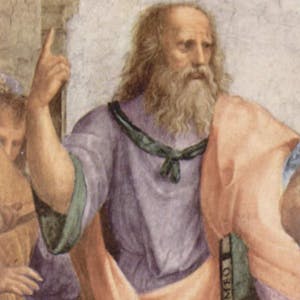Ancient Philosophy Plato & His Predecessors
What is philosophy? How does it differ from science, religion, and other modes of human discourse? This course traces the origins of philosophy in the Western tradition in the thinkers of Ancient Greece. We begin with the Presocratic natural philosophers who were active in Ionia in the 6th century BCE and are also credited with being the first scientists. Thales, Anaximander, and Anaximines made bold proposals about the ultimate constituents of reality, while Heraclitus insisted that there is an underlying order to the changing world. Parmenides of Elea formulated a powerful objection to all these proposals, while later Greek theorists (such as Anaxagoras and the atomist Democritus) attempted to answer that objection. In fifth-century Athens, Socrates insisted on the importance of the fundamental ethical question—“How shall I live?”—and his pupil, Plato, and Plato’s pupil, Aristotle, developed elaborate philosophical systems to explain the nature of reality, knowledge, and human happiness. After the death of Aristotle, in the Hellenistic period, Epicureans and Stoics developed and transformed that earlier tradition. We will study the major doctrines of all these thinkers. Part I will cover Plato and his predecessors. Part II will cover Aristotle and his successors.
None
Syllabus
Syllabus - What you will learn from this course
Week 1
The Milesians & Heraclitus
Week 2
Parmenides to Plato
Week 3
Plato on Virtue, Teaching, & Justice
Week 4
Plato on Reality & Goodness
FAQ
When will I have access to the lectures and assignments?
Access to lectures and assignments depends on your type of enrollment. If you take a course in audit mode, you will be able to see most course materials for free. To access graded assignments and to earn a Certificate, you will need to purchase the Certificate experience, during or after your audit. If you don't see the audit option:
What will I get if I purchase the Certificate?
When you purchase a Certificate you get access to all course materials, including graded assignments. Upon completing the course, your electronic Certificate will be added to your Accomplishments page - from there, you can print your Certificate or add it to your LinkedIn profile. If you only want to read and view the course content, you can audit the course for free.
Is financial aid available?
Yes. In select learning programs, you can apply for financial aid or a scholarship if you can’t afford the enrollment fee. If fin aid or scholarship is available for your learning program selection, you’ll find a link to apply on the description page.
Reviews
Its short duration course but so much new knowledge and conceptual. Really like the way of Socrates quesionning and moreover their analysis arguement is whole new best ever.
This course is an excellent introduction to reading & learning about ancient philosophers. The videos helped to make the works of Plato, Socrates & many others understandable. Thank you.
Insightful and informative course. Prof Meyer has managed to break down difficult concepts into simple, bite-sized knowledge for any lay person to understand effectively.
This was my first online course. In a crazy year, the flexibiilty to reset deadlines was much appreciated. I enjoyed the grading system, especially when your peers are from all around the world.
